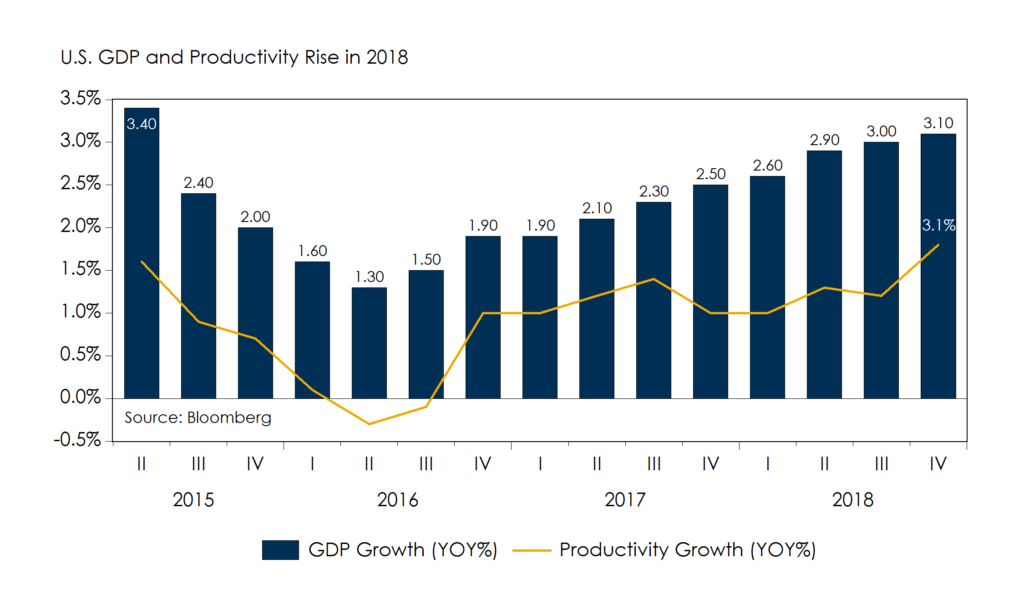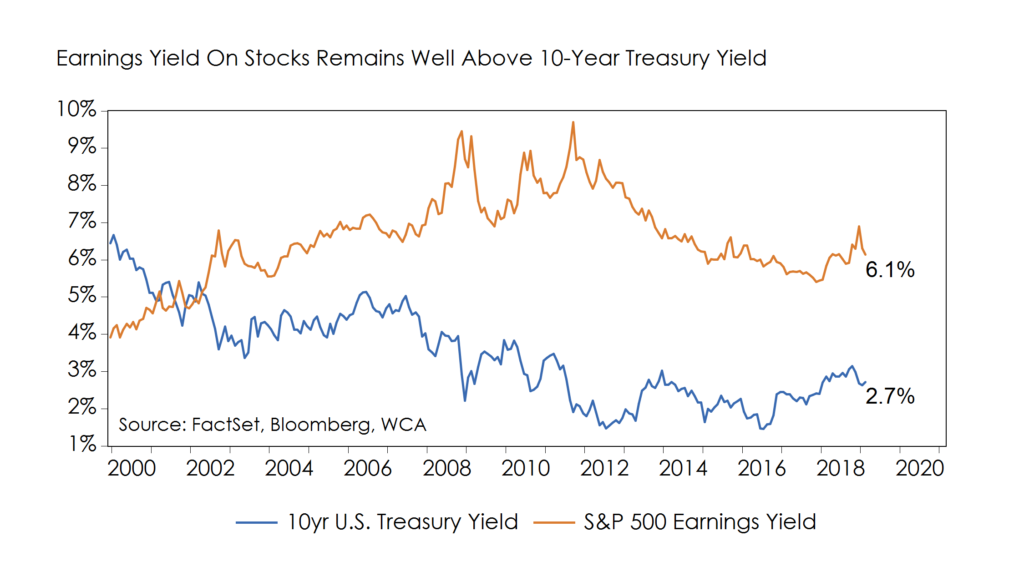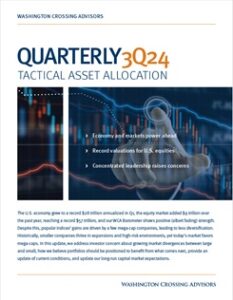Central Banks Fall In-Line
Central Banks Fall In-Line
The global economy worsened in recent months by most accounts, but policy changes are now in place that could foster some improvement. Central banks in the United States, China, and Europe recently began moving toward greater accommodation — a major shift from early last fall. The Federal Reserve is telegraphing a need for “patience”, China has unveiled tax cuts and increased bank lending, and the European Central Bank (ECB) is now signaling renewed stimulus. Slipping growth is the reason cited for most of this renewed accommodation.
Good Growth, Reasonable Valuation
The United States growth engine appears the most resilient versus other major developed economies, at least through the close of 2018. Output rose 3.1% in real terms last year, as underlying productivity accelerated to 1.8% (chart, below-top). Stocks generally declined last year while earnings rose, making stocks better valued. The S&P 500 now trades at about 16.5x forward earnings, in line with the last 5-year average valuation. The earnings yield, or inverse of the 16.5x forward multiple, is 6% which remains well above the 2.6% 10-year Treasury yield (chart, below-bottom). The combination of good domestic growth and reasonable valuations could provide some support for the bull case for U.S. stocks from here.


Europe Weakens Ahead of Key Brexit Vote
Other developed foreign markets like Europe remain under pressure. Weakness was on display again last week when Mario Draghi cut the ECB’s 2019 growth forecast to 1.1% from December’s 1.7% forecast. The central bank lowered forward guidance on rates, unveiled a fresh round of long-term refinancing operations (LTROs), and provided assurance that the ECB would hold off reducing its balance sheet.
In other European news, this Tuesday brings a major vote on Brexit. On Tuesday evening, after a full day of debate, Parliament votes on Theresa May’s deal with the European Union. This revised deal, if shot down, could lead to the UK leaving the European Union on March 29th with no deal or a delay in the departure date. If accepted, the UK will leave the EU on March 29 as planned, but things will remain relatively unchanged unto December 2020 as a permanent trade deal is worked out.
We will just have to wait and see.
Summing Up
Although global growth has weakened from a year-ago, continued growth in the United States, better valuations, and a turnabout by global central banks could promote improvement ahead. While it is too early to sound the “all clear” signal, these factors could conspire to bring about positive change as the weeks and months ahead unfold.
Kevin Caron, CFA, Senior Portfolio Manager
Chad Morganlander, Senior Portfolio Manager
Matthew Battipaglia, Portfolio Manager
Suzanne Ashley, Analyst
(973) 549-4168
www.washingtoncrossingadvisors.com
www.stifel.com
Disclosures
WCA Fundamental Conditions Barometer Description: We regularly assess changes in fundamental conditions to help guide near-term asset allocation decisions. The analysis incorporates approximately 30 forward-looking indicators in categories ranging from Credit and Capital Markets to U.S. Economic Conditions and Foreign Conditions. From each category of data, we create three diffusion-style sub-indices that measure the trends in the underlying data. Sustained improvement that is spread across a wide variety of observations will produce index readings above 50 (potentially favoring stocks), while readings below 50 would indicate potential deterioration (potentially favoring bonds). The WCA Fundamental Conditions Index combines the three underlying categories into a single summary measure. This measure can be thought of as a “barometer” for changes in fundamental conditions.
The information contained herein has been prepared from sources believed to be reliable but is not guaranteed by us and is not a complete summary or statement of all available data, nor is it considered an offer to buy or sell any securities referred to herein. Opinions expressed are subject to change without notice and do not take into account the particular investment objectives, financial situation, or needs of individual investors. There is no guarantee that the figures or opinions forecasted in this report will be realized or achieved. Employees of Stifel, Nicolaus & Company, Incorporated or its affiliates may, at times, release written or oral commentary, technical analysis, or trading strategies that differ from the opinions expressed within. Past performance is no guarantee of future results. Indices are unmanaged, and you cannot invest directly in an index.
Asset allocation and diversification do not ensure a profit and may not protect against loss. There are special considerations associated with international investing, including the risk of currency fluctuations and political and economic events. Investing in emerging markets may involve greater risk and volatility than investing in more developed countries. Due to their narrow focus, sector-based investments typically exhibit greater volatility. Small company stocks are typically more volatile and carry additional risks, since smaller companies generally are not as well established as larger companies. Property values can fall due to environmental, economic, or other reasons, and changes in interest rates can negatively impact the performance of real estate companies. When investing in bonds, it is important to note that as interest rates rise, bond prices will fall. High-yield bonds have greater credit risk than higher-quality bonds. The risk of loss in trading commodities and futures can be substantial. You should therefore carefully consider whether such trading is suitable for you in light of your financial condition. The high degree of leverage that is often obtainable in commodity trading can work against you as well as for you. The use of leverage can lead to large losses as well as gains.
All investments involve risk, including loss of principal, and there is no guarantee that investment objectives will be met. It is important to review your investment objectives, risk tolerance and liquidity needs before choosing an investment style or manager. Equity investments are subject generally to market, market sector, market liquidity, issuer, and investment style risks, among other factors to varying degrees. Fixed Income investments are subject to market, market liquidity, issuer, investment style, interest rate, credit quality, and call risks, among other factors to varying degrees.
This commentary often expresses opinions about the direction of market, investment sector and other trends. The opinions should not be considered predictions of future results. The information contained in this report is based on sources believed to be reliable, but is not guaranteed and not necessarily complete.
Washington Crossing Advisors LLC is a wholly owned subsidiary and affiliated SEC Registered Investment Adviser of Stifel Financial Corp (NYSE: SF).



